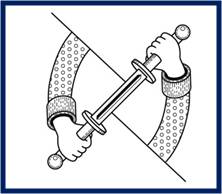Monday Author: Susanne Skinner
The other day I asked my Dad if he could hear me. He said no.
I’d like to dispel the belief that as our parents age and we take on the role of caregiver we become the parent. The reality is this: if you are the adult child of an aging parent (as I am) you will always be their child and they will remain your parent. The child does not become father to the man. It becomes a role reversal only in the sense that it is a process of compassion and repayment for the parental care they provided to you.
The Sandwich Generation
 Today, over 65 million adult children older than fifty are caring for aging parents. We are referred to as the sandwich generation—people who had children later in life and find ourselves paying college tuition and caring for aging parents at the same time. As we grew older so did they.
Today, over 65 million adult children older than fifty are caring for aging parents. We are referred to as the sandwich generation—people who had children later in life and find ourselves paying college tuition and caring for aging parents at the same time. As we grew older so did they.
We are either entering or are part of a generation of people who live longer, grapple with chronic afflictions and illnesses, navigate the mine field known as Medicare, and confront the fact that our parents may outlive their financial resources
Aging parents need help with finances, personal care, medical care and everything in between, but no matter how old that person is they will always be your parent. The blurred lines of identity as our parents advance in age and we become their caregivers create tremendous strain on our ability to manage the day-to-day demands of this role along with our own lives and responsibilities.
As the adult children of this generation, we are enjoying an empty nest, planning for our own retirement and suddenly find ourselves face to face with the role reversal of caring for an elderly parent. We get a new unpaid job that is both a labor of love and a sacrifice. I feel the pull of both emotions and struggle for balance.
The Double Edge of the Sword
Caregivers are most often women, providing over 75% of needed support to aging parents. In caring for those who cared for us we will provide 37 billion hours of unpaid assistance each year for adult family members with illnesses or conditions that prevent them from handling the routine activities of daily living.
 Statistics show the number of adults taking care of aging parents has tripled in the past 15 years, and today 25 percent of grown children are helping their parents by providing them with personal care, financial assistance…or both.
Statistics show the number of adults taking care of aging parents has tripled in the past 15 years, and today 25 percent of grown children are helping their parents by providing them with personal care, financial assistance…or both.
The financial costs are staggering, especially if the caregiver must take time off or quit a job. When adult children quit their jobs or reduce hours they not only give up immediate income, they risk a decrease in the amount of their Social Security income. They might also give up additional pension benefits.
When you combine lost wages, Social Security and pension benefits, caregivers’ losses total $3 trillion. The average adult child who is a caregiver loses $303,880 in lifetime wages and retirement benefits.
The number of Americans 85 and over is growing rapidly. Estimates are that this segment of the population will triple in size by 2020. The oldest-old are especially important since this group of elderly is most likely to share health problems with children who are elderly themselves.
Lessons Learned from an Elderly Parent
I officially assumed my dad’s caregiving when I began doing things for him I had never done before. Once he stopped doing them they became my responsibility. Unfortunately for both of us, he waited way too long.
He developed some standard responses to frequently asked questions, like “You do it,” and my personal favorite, “Well, I don’t know anything about that” which was in response to my query about why his Social Security checks were being returned. He closed his checking account and failed to notify them.
When I thought he was agreeing with me he was really just nodding his head as he could not hear me or clearly understand what I was saying. We bought new hearing aids.
I began to understand the aging process was as difficult for him as it was for me. The changes were often frightening and complicated for both of us. I developed a new kind of patience.
Starting on the Journey
 I learned not to set expectations, and worked hard at being flexible as we began a journey through unfamiliar territory. This meant rearranging my own schedule, canceling work and personal travel and using vacation time to make the six-hour round-trip drive to the assisted living community where he lived.
I learned not to set expectations, and worked hard at being flexible as we began a journey through unfamiliar territory. This meant rearranging my own schedule, canceling work and personal travel and using vacation time to make the six-hour round-trip drive to the assisted living community where he lived.
But it also meant seeing my father as an individual, not just as my Dad. I tried hard not to assume a judgmental parenting role, failing miserably time and again before acknowledging the burden of care giving can be undertaken differently; willingly and with love.
As the primary care giver it is up to me to communicate his declining mental and physical health to my siblings, explaining that Dad was managing less and less of his everyday needs. It is hard for them to visualize, much less comprehend. I have to constantly step back from the black hole of martyrdom. Resentment is often a byproduct of caregiving; but I resent the situation, not my Dad.
My biggest challenge is finding myself caught between my Dad’s needs and my own, including time, career, family and plans that have to be balanced and sometimes sacrificed.
No Regrets
I’m not sure Dad notices or even cares that I am the one who underwrites the quality of life he has. I am learning to let that go, recognizing there are things I can control and things I can’t.
I want to look back with love and appreciation on the time we spend together. When it gets to be too much I remind myself that raising me was not an easy path and there is no doubt in my mind whose job was more difficult.
